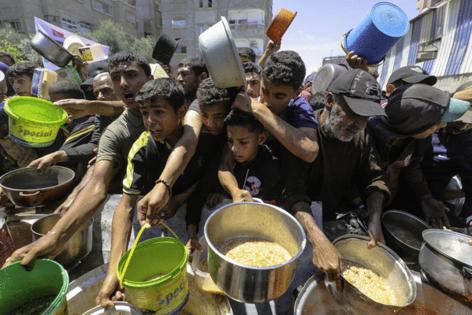Israel eases Gaza aid curbs, hoping to defuse hunger outcry
Published in News & Features
Israel rolled back curbs on aid distribution to Gaza over the weekend in an effort to defuse a growing international outcry over hunger convulsing the shattered Palestinian enclave.
The Israel Defense Forces on Sunday suspended some military operations against Hamas to facilitate the movement of U.N. relief convoys, and restored electricity supplies to a desalination plant in Gaza for the first time since March.
The U.N. World Food Program has warned for weeks that the entire population of 2.1 million people in the Gaza Strip faces crisis levels of food insecurity. Scores of aid groups say starvation is fast spreading.
That’s seen world anger toward Israel’s government on the rise amid increasing reports and images of emaciated babies, children crammed into soup queues, and men tussling over bags of flour.
German Chancellor Friedrich Merz spoke by phone on Sunday with Israeli Prime Minister Benjamin Netanyahu, expressing “deep concern about the catastrophic humanitarian situation in Gaza” and urging “further substantial steps,” according to a readout from his office.
While continuing to deny accusations that it’s deliberately starving Gazans, Israel has now begun parachuting in food supplies. That’s a delivery mechanism tried by several foreign air forces a year ago but abandoned, at the time, amid concerns about scale and safety.
“There’s a campaign full of lies under way” that’s created “a mistaken impression of famine in Gaza,” Danny Danon, Israel’s ambassador to the U.N., told Tel Aviv radio station 103 FM. “Therefore the cabinet decided yesterday to bring in aid, in order to show the world that we are heeding the claims, even if we disagree about the facts.”
Sunday’s decision was announced by the military without comment from Netanyahu or Defense Minister Israel Katz. It marked a de facto reversal of Israel’s cut-off of U.N.-led humanitarian relief in March after the previous Gaza ceasefire expired, a tactic Netanyahu aides had said would deprive Hamas of a means of controlling the populace while feeding its own fighters.
Mahmoud Mardawi, a senior Hamas official, described the about-face on Telegram as “not a solution, but rather, a belated and twisted confession of a crime having been committed.”
Negotiations in Doha on a new truce faltered last week, with Israel and the U.S. accusing Hamas of stonewalling and hinting that a further escalation in the more than 21-month-old war could follow.
“I think they want to die, and it’s very, very bad,” U.S. President Donald Trump said of the Iran-backed Palestinian Islamist fighters on Friday. “It got to a point where you’re going to have to finish the job.”
No immunity
Eli Cohen, a minister in Netanyahu’s security cabinet, said plans for the next stage of the war had been approved. Interviewed on Israel’s Army Radio, he gave no details. He did, however, reiterate that Israel doesn’t consider Hamas leaders abroad to have “immunity” from its attacks.
Israeli troops and tanks have already overrun 75% of the Gaza Strip, skirting areas where Hamas is believed to be holding 50 hostages. The proposed truce would have returned half of them in exchange for hundreds of jailed Palestinians, and boosted aid for Gaza, over a period of 60 days.
Recovering the remaining hostages, however, would have required Israel commit to ending the war and fully withdrawing, Hamas said. Israel has ruled that out so long as Hamas, which is on terrorism blacklists in much of the West, retains weaponry and rules in Gaza.
Israeli National Security Minister Itamar Ben Gvir, a far-right member of Netanyahu’s coalition government, said he was excluded from the decision to restore U.N. aid. His ideological kinsman, Finance Minister Bezalel Smotrich, also opposes pausing the assault on Hamas and wants a total Gaza takeover — even if that poses a risk to the 20 hostages believed to be still alive.
Netanyahu on Friday said Israel and the U.S. were “considering alternative options to bring our hostages home, end Hamas’s terror rule, and secure lasting peace for Israel and our region.” That followed a threat by Katz that the “gates of hell will open” if Hamas didn’t free the hostages soon.
Asked on 103 FM if Israel what such statements might presage, Danon said: “I’m not aware of any inventions that haven’t already been tried.”
More than 59,000 Palestinians have been killed in the war, according to the Hamas-run health ministry, which doesn’t distinguish between civilians and combatants. Israel launched the offensive in retaliation for a Hamas cross-border raid on Oct. 7, 2023 in which about 1,200 people were killed and 250 kidnapped. It has lost 455 soldiers in Gaza combat, including three over the weekend.
Aid convoys from Jordan and Egypt rolled into Gaza on Sunday. The Israeli military said “humanitarian corridors,” around which it would hold fire, were being established in coordination with the U.N. for deliveries to areas where ground forces aren’t active. Construction of a UAE-initiated water pipeline from Egypt to Gaza would commence in the coming days, it added.
When it sidelined the U.N. relief network earlier in the year, Israel set up a U.S.-backed alternative, the Gaza Humanitarian Foundation, with the aim of excluding Hamas.
The foundation says it’s distributed enough food staples for more than 90 million meals, yet has acknowledged not being able to reach all of Gaza’s population. It’s also been dogged by allegations that hundreds of Palestinians aid-seekers have been shot dead near its distribution points — incidents for which the GHF and IDF have denied responsibility.
Ghazi Hamad, a senior Hamas official, told Al Araby TV on Saturday that as part of the truce talks, Israel had agreed to disband the GHF. Israeli officials have neither confirmed nor denied that.
_____
(With assistance from Fadwa Hodali and Alexander Weber.)
_____
©2025 Bloomberg L.P. Visit bloomberg.com. Distributed by Tribune Content Agency, LLC.







Comments